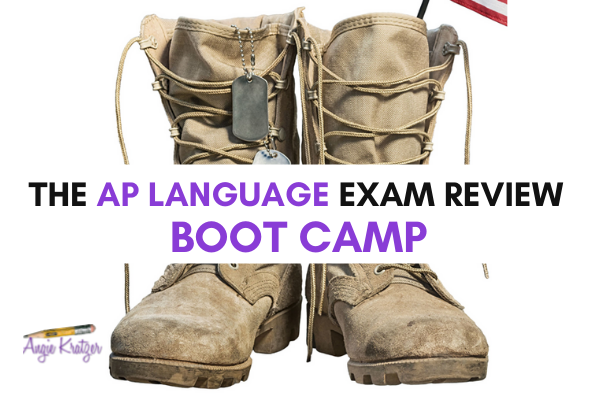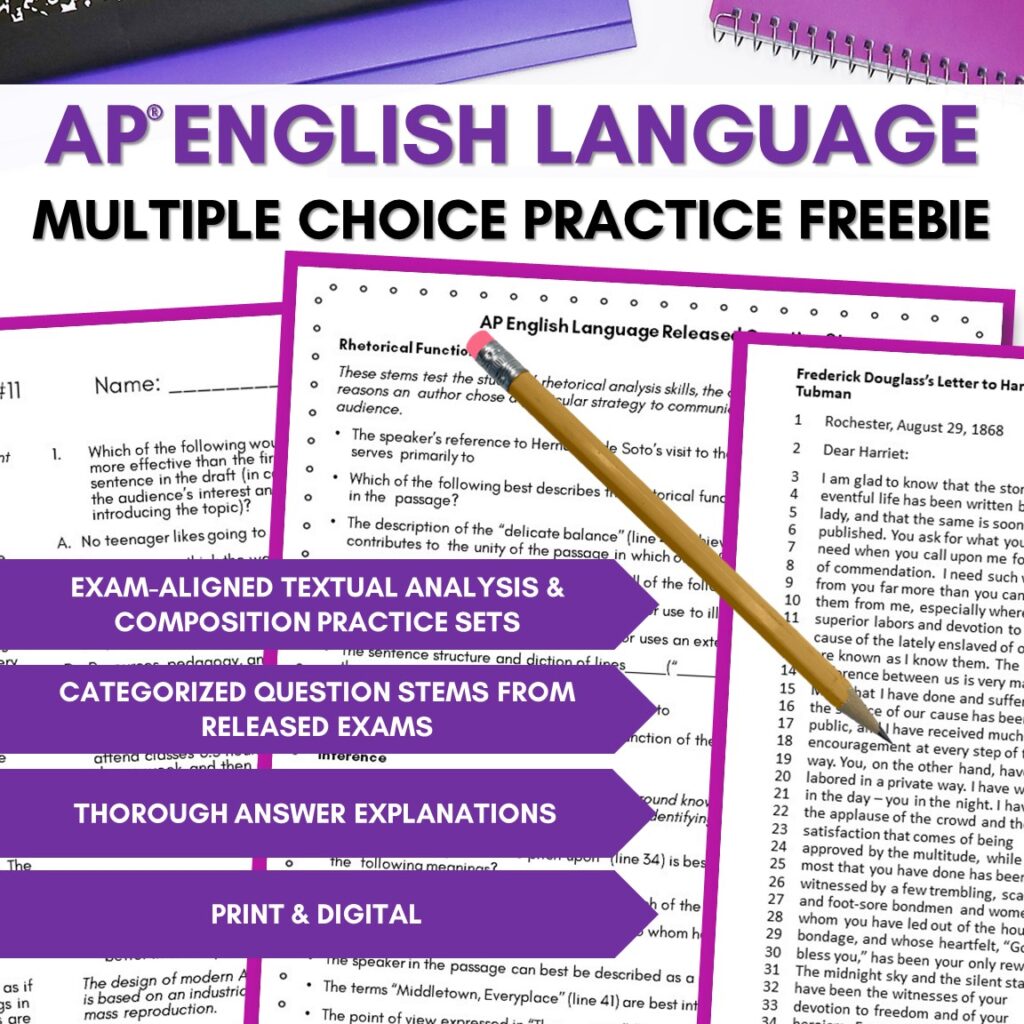How much review for the AP Language Exam is TOO much? On a skill-based assessment like this one, students are already at a position of not-quite-there, proficiency, or mastery of a complex web of interrelated skills and processes. Like I said in a recent refresher review post, there is no such thing as cramming for an AP English exam. That might work on a content-based test, but it doesn’t work here.
So why review at all?

Fronting for the AP Lang Exam
If you’ve ever worked in a grocery store, you know what fronting is. That’s bringing the oldest items on a shelf to the front in order to sell them before selling the freshest items. (If you want the best veggies, reach in the back!) Think of exam review like fronting. There’s some dusty old rhetorical analysis stuff back there, and students need to front that material. They remember what a logical fallacy is, but they need a quick refresher of the major ones like non-sequitur, straw man, and hasty generalization.
Streaks vs. Slumps
My hype song is Katie Perry’s “Roar.” Don’t laugh. When I’m about to get on a live webinar, I blast this song on my Alexa so that every board in my home is vibrating. The next time you’re on a live webinar with me, ask me if I roar. It’ll be our little inside joke.
My husband was a baseball player, and he had lucky socks. This man believes strongly in ritual and avoiding jinxes. He once explained to me that a baseball streak is about 90% confidence, a certainty that a player is going to do well. Slumps work the opposite way.
I don’t want my students going in to the exam with a slump mentality, like they’ve struck out 35 times in a row. I want them going in believing that they are about to hit a home run.
So let’s front and build that skill confidence with an AP Language exam review.
The Five-Day Plan for an AP Language Exam Review
I see a number of teachers in distress over the few class meetings they have left before the exam. Let’s say, hypothetically, that Spring Break, other AP exams, and random award assemblies are eating away at your class time, and you’re only going to see your students five more times before the AP Language exam. Let’s plan that out.
Day 1: Reach Back to Early AP Language Content and Skills
Unless you’re a master at spiraling, you might have some students asking, Now what is rhetoric again? Reach way back on the shelf and pull forward
- the Rhetorical Analysis thesis
- the Question 2 rubric (Here’s a student-friendly version if you need one.)
- quick planning strategies like SOAPS, SPACECAT, or the rhetorical triangle
Favorite Review Activity: Give students a released prompt and ten minutes to read, sketch out SOAPS or the planning strategy of their choice, and write a thesis.
Helpful resources:
- Rhetorical Analysis Review Pages
- Rhetorical Analysis Bell Ringers
- This blog post on Rhetorical Analysis Review Tips might give you some ideas as well.
Day 2: Revisit Argument
Don’t cram here.
- Review basic Aristotelian/Classical argument structure.
- Review the kinds of evidence students might use.
- Stress the need for concession and refutation. Show models that work.
- Spend a little time on basic fallacies in case students come across one in the multiple choice passages or in Question 2.
Favorite Review Activity: Give students a prompt and require them to take a “side” if there are clear sides and then flip the students to force them to argue a thesis with which they disagree in order to develop concession skills.
Helpful review resources:
- 10 Argumentative Prompts (These prompt are aligned in content and format with Question 3 of the AP Language exam.)
- Blog post: The Big Picture of AP Lang Argumentation Review
Day 3: Revisit Synthesis
100% skill based, this question simply requires practice and some serious time management.
- Offer a quickie review of parenthetical citation and stress consistency and credit where it is due.
- Reviews best practices (e.g., how many sources to use, the synthesis thesis).
- Review image analysis. Here’s a good blog post on guiding students on analysis of photography, art, and cartoons.
Favorite Review Activity: Create a gallery walk of sources. Students get the prompt on paper and walk from source station to source station with a partner debating which ones to use. They come back to their desks, write a thesis together, and present that thesis to the class along with their source choices.
Helpful review resources:
- Blog post: AP Language Synthesis Review Tips
- Read ’em and Weave Synthesis Unit
- Synthesis Practice Prompt (Part of the unit above)
Day 4: Go Over Multiple Choice Strategies
There are strong readers. There are strong test takers. You might be fortunate enough to have students who are both, but there are ways to make up for one weakness with the other. Use this day to focus on strengthening the mechanics of taking a HARD multiple choice exam in a given time frame.
I once had a student who, with enough time, could get correct any multiple choice question I put in front of her. She was a VERY good reader, but she could not get through more than half of any timed practice. What she and I worked on was perfectionism and her compulsion to double check and second guess herself. These tips worked for her:
- The second guessing happens with the foil, that one answer choice that is the truest test of a student’s ability to analyze or edit. Practice quick elimination with the five answer choices so that students are left with the foil and the correct answer and can choose quickly and get to the next question.
- Go over common stems and make sure students understand what they are being asked. I created a student-friendly stems list, and you can get that here. It will come automatically to the email address you give. (I recommend a personal address so it doesn’t bounce.)
- Have a heart-to-heart about EXCEPT questions. My complaints about bad question design choice have fallen on deaf ears, so there will be a sprinkling of these time killers. On average, a student needs to spend less than a minute on each question. That’s almost impossible with these monsters. I recommend that students eliminate three as quickly as they can, guess, and go on.
Favorite Review Activity: Create a Four Corners game with a couple of questions and have students practice their time management strategies and create a class debate about answers. Here’s a blog post about pulling it off.
Helpful Review Resources:
- Multiple choice blog post roundup
- AP Lang Multiple Choice Bundle (This bundle of 14 resources includes two practice tests, 50 bell ringers, and a collection of activities on question design.)
Day 5: In your AP Language Exam Review, Show Them How Far They Have Come
On the last day you have students before the exam, pull out the first essays they wrote. (Kudos if you saved that beginning-of-the-course baseline essay!) and show students where they were. Beside it, put the best, highest-scoring example of their skills (ideally in the same mode).
Sit back and watch them laugh. If you like, ask each student to write two things for you.
- A letter from the student to the teacher explaining the student’s current strengths.
- A letter from the student to herself with reminders about thesis statements, leaving time to proofread, etc.
Discuss controlling what they can control.
- Drink water the night before and the morning of. Our brains are fuzzy when we’re dehydrated.
- Sleep eight hours the night before the exam (three nights in a row, ideally).
- Eat protein for breakfast (milk product, eggs, meat, soy). No soda the morning of! A carb crash serves no one.
- Avoid drama the morning of the exam. Stay off Snapchat and avoid siblings and ex girlfriends at all cost.
Some teachers give out goodie bags the day before the exam. This might be a couple of sharpened #2 pencils, a good black pen, and some mints. An encouraging, hand-written note would be great . . . unless you have 100 students testing.
Pat yourself on the back, friend. You have prepared hormonal, anxious teenagers for an Advanced Placement English Language & Composition exam during a pandemic. Well done, you. Don’t forget to grab this free ten-page multiple choice review.


